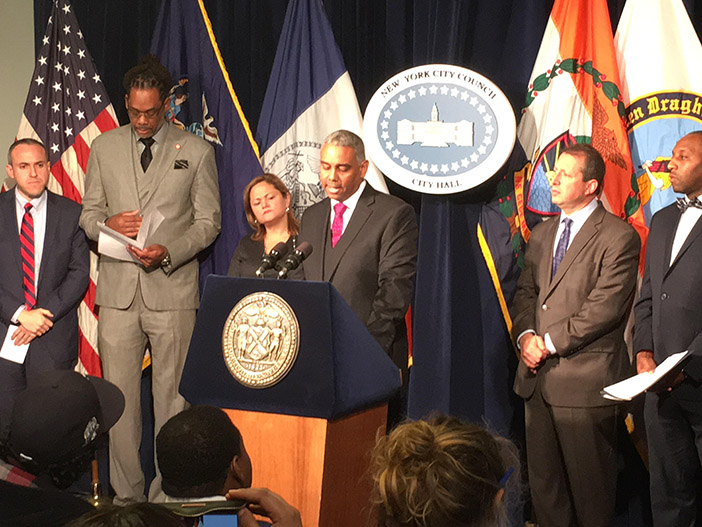Photo Courtesy of Councilman Wills’ Office
Councilman Wills proposed Intro. 464, which was approved by the Council last week. It would require the Department of Correction to provide absentee ballot applications and forms to the voting-eligible individuals in its custody, and forward them to the City Board of Elections.
By Forum Staff
The City Council last week approved two legislative components that, according to the lawmaking body, advance the rights of detainees and formerly incarcerated felons to vote.
Two years ago, Councilman Ruben Wills (D-Jamaica) proposed Introduction 464, which would require the Department of Correction to provide absentee ballot applications and forms to the voting eligible individuals in its custody, and forward them to the City Board of Elections. These materials would be provided no later than two weeks prior to any primary, special, or general election.
Wills said that the more than 10,000 detainees on Rikers Island often do not realize they are eligible to vote via absentee ballot, as determined by the U.S. Supreme Court in O’Brien v. Skinner (1974).
Current State Election Law only permits either a person serving probation or whose sentence has expired to be eligible to vote in an election, whereas anyone currently incarcerated for a felony conviction or yet to be discharged from parole is ineligible to do so.
Introduction 464 will go into effect 90 days after it is signed into law.
Resolution 870 – co-sponsored by Councilmen Ydanis Rodriguez (D-Manhattan), Ben Kallos (D-Manhattan), and Wills – calls on the State to enact Assembly Bill 7634 by Assembly Correction Committee Chair Daniel O’Donnell (D-Manhattan), which would restore voting rights to all individuals with a felony conviction who are no longer serving their prison sentences, including those eligible for presumptive or conditional release or post-supervision release.
“A criminal justice system that is already disproportionately tilted against persons of color should neither obstruct nor completely sever every lasting means by which the incarcerated can maintain their place in society,” Wills said. “For generations, people awaiting trial that were too poor to secure bail had been denied their constitutional right to vote. Detainee Absentee Voting will begin to change the course of that history, but still more work lies ahead to provide even greater equality, as nearly 100,000 individuals in New York who have a felony conviction continue to be deprived of that right. So, I am proud the Council has also voted to join me and my colleagues Ydanis Rodriguez and Ben Kallos in our call for the State of New York to launch a new suffrage movement by restoring voting rights to those who have paid their penance. Civic engagement is a fundamental part of the community reintegration process. If we truly consider ourselves to be members of a just and decent society, such oppressive laws can no longer be allowed to stand.”
O’Donnell added, “The right to vote is a cornerstone of our democracy, but for many formerly incarcerated individuals, this right is not guaranteed. Once a person has left the confines of prison, he or she should be given every opportunity to reenter into society, regardless of serving a parole sentence. I applaud the work of these Council Members to pass Resolution 870. I look forward to garnering support for this bill in the coming session so we can continue the fight to end voter disenfranchisement in New York State.”

